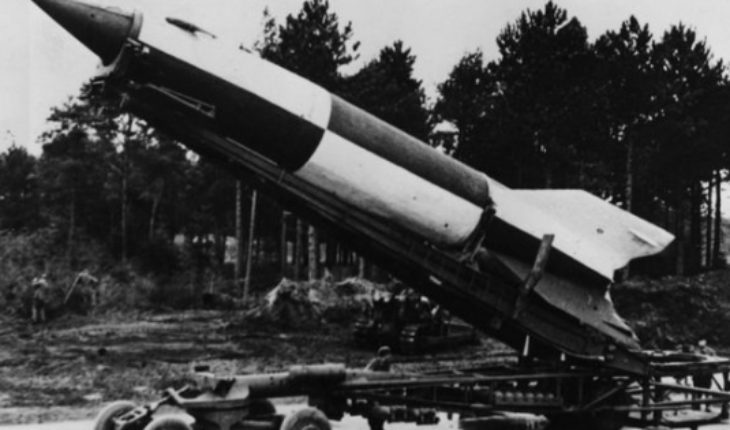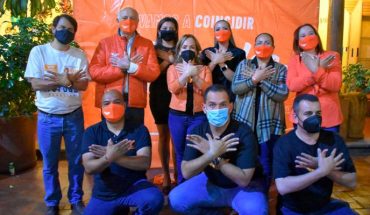However, the article caused great controversy and was quickly removed. The reason? It had not been mentioned that he was a Nazi.
There are few corners of scientific progress that have not been tarnished, at some point in their history, by immoral or unethical behavior.
The US-funded “dangerous experiments” that some scientists say could unleash a pandemic
“I was looking for fame and fortune”: China’s harsh accusation against the scientist who claimed to have genetically modified two babies
Physics, biology, zoology, medicine, psychology, anthropology, genetics, nutrition, engineering… All are plagued by discoveries made in circumstances that can be described as unethical and even illegal.
How should we feel using that knowledge, especially when it could be of great help to civilization and even save lives?
Von Braun’s presence in the Apollo program was not an outlier.
More than 120 German scientists and engineers joined him, including his SS partner, Officer Kurt Debus (who became director of NASA’s Launch Operations Center) and Bernhard Tessmann (designer of the colossal building for assembly space vehicles in what is now the Kennedy Space Center).
They were among the 1,600 scientists who were recruited by spies at the end of World War II, as part of Operation Paperclip, which gave them protection from possible prosecution and safe conduct to enter the United States and permission to continue their work.
Controversial contributions
Allied forces also used other Nazi innovations.
Wernher von Braun was one of many German scientists who were recruited by the Allies at the end of World War IINeurotoxic agents such as tabon and sarin (which would drive the development of new insecticides as well as weapons of mass destruction), the antimalarial chloroquine, methadone and methamphetamines, medical research on hypothermia, hypoxia, dehydration and more, were all produced from experiments with humans conducted in concentration camps.
The agglomerate boards, some forms of synthetic rubber and the Fanta soft drink were also developed by the Germans under the Nazi regime.
But this was far from an exceptional case of unethical research into the history of science.
For 40 years, beginning in 1932, researchers at Tuskegee University in Alabama tracked the progress of syphilis in hundreds of poor black men, none of whom had ever received a diagnosis or treatment, despite the antibiotic penicillin that could cure the disease was already available at that time.
In a related study, U.S. physicians in the 1940s intentionally infected patients with sexually transmitted infections to study these diseases. Aware of the scandal this could cause, the experiments were conducted in Guatemala.
From 1955 to 1976, in what became known as “The Unfortunate Experiment,” hundreds of women with precancerous lesions were left untreated to see if they developed cervical cancer. Details of the study only came to light following a complaint from two women’s health advocates, Sandra Coney and Phillida Bunkle.
The study, which was conducted in New Zealand, wanted to test some theories on the importance of early intervention, but a subsequent inquiry into this research by Judge Silvia Cartwright criticized the treatment of patients for of the doctors who conducted the study.
The polio vaccine, in addition to many other medical advances, owes its existence to human cells that were taken from Henrietta Lacks without their knowledge or consent.
The cells that doctors took from Henrietta Lacks have served to develop numerous investigationsShe never received any compensation. The cell line grown from these initial samples has been used in countless researches on drugs, toxins, viruses and also to study the human genome.
In the 1950s, Robert G Heath pioneered the use of electrodes implanted in the brain in an attempt to change sexual orientation. Today, a similar technology is used as a treatment for epilepsy, Parkinson’s disease and the neural cord recently announced by Elon Musk.
Ethical dilemma
It is not controversial to claim that these experiments should never have happened. But now that they’ve happened, what should be done with the information obtained?
“The elementary intuition is that if an information was obtained in an unethical manner and we use that information, then we became complicit in that past action,” says Dom Wilkinson, a specialist in Medical Ethics at The University of Oxford.
This is a fairly common view, even among those who make use of such findings.
In the journal of bioethics The Hastings Center Report, in 1984, Kristine Moe recounts a conversation she had with John Hayward, a leading expert on hypothermia at the University of Victoria in Canada who used Nazi data in her studies.
Nazi doctors conducted brutal experiments on concentration camp prisoners”I don’t want to have to use this information, but there won’t be another one and there won’t be another one in an ethical world,” he said. “I’ve justified it a little. But not using it would be equally bad.”
But Hayward’s experience was unusual.
“I think it’s important to say that these findings rarely provide key information in isolation,” Wilkinson says. “For the most part, scientific information is like a piece of a puzzle: it fits into a general puzzle.”
Wernher von Braun’s contributions to the Apollo space program may have been considerable. But it is impossible to know whether or not NASA could have solved the problem of how to land on the Moon without your help and the knowledge it gained while working on the Nazis’ V-2 rocket program.
Meanwhile, the results of the so-called “unfortunate experiment” and Tuskegee’s did not drastically change our understanding of syphilis or cancer or its findings were so essential.
“There aren’t many other observational studies that see what happens if cervical cancer isn’t being treated,” Wilkinson says. “But even if you said ‘we don’t use this part of science,’ we wouldn’t have a different understanding of cervical cancer.”
It may be tempting to think that unethical medical practices are a thing of the past, that modern medicine at odds with immorality was an aberrant incident in the mid-20th century, and that as we go along the work done then it will become irrelevant from a scientific point of view.
The polio vaccine preserves the health of millions of people around the world, but it has its origins in ethically questionable practices from now on, we could tell ourselves that our entire data collection will be legitimate and our discoveries will be ethically sound. But unfortunately, that’s not the case.
Similar to syphilis studies conducted in Guatemala, many clinical trials are currently conducted in developing countries for the same questionable reasons: regulations are more lax and the risk of reputational damage is reduced by any negative results.
A 2008 report published by the Multinational Corporations Research Center released details of many of these unethical essays, conducted in India, Nigeria, Russia, Argentina and Nepal, among others.
This report revealed the unreported deaths of 14 women in Uganda during a trial of Nevirapine, an HIV-positive drug.
He also publicized that eight patients in the Indian city of Hyderabad died during a trial of the anticoagulant drug streptokinase and none of them knew it was part of that experiment.
Bad example
The need to do something good with the data, even if it was obtained unethically, leads to its own problems. Aside from carry the burden of complicity, does the use of the findings tell current and future researchers that it is better to ask forgiveness than to ask permission?
“There is one very particular thing about knowledge and it is irreversible. You can’t miss something,” Wilkinson says.
“One of the concerns of using the data is that it expresses the position that this research was well and encourages future researchers: ‘history will judge me positively.’ We don’t want to do that. We don’t want to promote unethical research.”
Doubts a Chinese scientist’s announcement of a baby’s first genetic modification
“I was looking for fame and fortune”: China’s harsh accusation against the scientist who claimed to have genetically modified two babies
Wilkinson highlights the recent case of the Chinese researcher who announced in 2018 that he had created the first babies from edited genes. “It’s a really surprising example; it seems that he was motivated by the particular fame associated with being the first,” Wilkinson says.
The China Health Commission shares this view. His inquiry into the investigation concluded that the scientist “illegally conducted research in search of fame and personal gain.”
He Jiankui, the Chinese scientist who claimed to have genetically modified two babiesLike other people who commit crimes that attract attention in search of notoriety, Wilkinson says, we must make effortsso as not to approve their behavior or give them the promotion they pursue.
But even if we can separate the actions of the people from the science they do, condemning the researcher while doing something good with the information he obtained, we are not yet found outside the moral maze. What happens when the problematic investigation has not yet been done, but it could be executed?
That is the dilemma posed by a controversial collection of blood samples from more than three million Scots that is currently on the NHS Health Board Greater Glasgow and Clyde.
The samples were collected as part of a routine “heel prick” test performed on all newborns to check a number of genetic conditions. But from 1965 to 2003, parents’ permission was never sought to store blood samples, meaning that the entire database is legally questionable.
As the world’s oldest and largest collection of Guthrie cards (as these types of records are known), the database offers an extraordinarily broad view of the nation’s genetics, making it a unique resource for researchers Medical.
But due to the issues related to how they were collected, there is currently a moratorium on conducting investigations using the cards.
“These types of situations are not directly ‘ethical’ or ‘unethical’: they involve conflicting ethical concerns, all of which must be taken into account,” says Anne Wilkinson, program manager at Nuffield’s Bioethics Council, who has written about Guthrie cards from Scotland.
Unauthorized collection of the results of “heel prick” poses serious ethical dilemmas for researchersShe believes that significant social benefits can be obtained through the use of the database. “But this would not simply overcome concerns about consent, privacy, risks to people associated with using their personal information, and respecting people’s opinions about their use,” he says.
Scotland’s healthcare authorities are now participating in consultations with researchers, ethics specialists, patients and citizens on what to do with Guthrie cards.
One option is to allow those who oppose being part of any card research to leave, but it is not an easy task to demonstrate that the permission of three million people has been properly sought retroactively.
It is proper for human nature to try to get something good out of bad situations. Even in the Warsaw ghettos, Moe notes, Jewish doctors made meticulous notes on the health of their fellow residents, data that was smuggled and then published as an unprecedented study on the effects of the starton on Bless you.
“The decision to use the data should not be made without regretor or without acknowledging the incomprehensible horror that produced it,” he says of the Nazi investigation.
“We cannot give any implicit approval to the methods. However, we must also not let the inhumanity of such experiments blind us to the possibility that something good may be rescued from the ashes.”
translated from Spanish: Is it ethical to use Nazi scientific discoveries to save lives?
August 18, 2019 |





